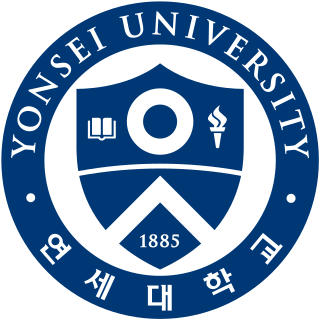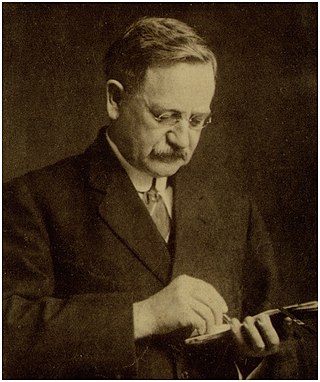
A registered nurse (RN) is a nurse who has graduated or successfully passed a nursing program from a recognized nursing school and met the requirements outlined by a country, state, province or similar government-authorized licensing body to obtain a nursing license. An RN's scope of practice is determined by legislation, and is regulated by a professional body or council.

Keijō Imperial University was an Imperial University in Keijō (Seoul), Korea, Empire of Japan that existed between 1924 and 1946.
A Doctor of Medicine is a medical degree, the meaning of which varies between different jurisdictions. In the United States, and some other countries, the M.D. denotes a professional degree. This generally arose because many in 18th-century medical professions trained in Scotland, which used the M.D. degree nomenclature. In England, however, Bachelor of Medicine, Bachelor of Surgery (M.B.B.S.) was used: in the 19th century, it became the standard in Scotland too. Thus, in the United Kingdom, Ireland and other countries, the M.D. is a research doctorate, honorary doctorate or applied clinical degree restricted to those who already hold a professional degree (Bachelor's/Master's/Doctoral) in medicine. In those countries, the equivalent professional degree to the North American, and some others' usage of M.D. is still typically titled Bachelor of Medicine, Bachelor of Surgery.
A medical school is a tertiary educational institution, professional school, or forms a part of such an institution, that teaches medicine, and awards a professional degree for physicians. Such medical degrees include the Bachelor of Medicine, Bachelor of Surgery, Master of Medicine, Doctor of Medicine (MD), or Doctor of Osteopathic Medicine (DO). Many medical schools offer additional degrees, such as a Doctor of Philosophy (PhD), master's degree (MSc) or other post-secondary education.

Yonsei University is a private Christian research university located in Seoul, South Korea. Yonsei is one of the prestigious group of three universities in the nation referred to as SKY universities.
A Bachelor of Medicine, Bachelor of Surgery is a medical degree granted by medical schools or universities in countries that adhere to the United Kingdom's higher education tradition. Despite the historical distinction in nomenclature, these degrees are typically combined and conferred together. This degree is usually awarded as an undergraduate degree, but it can also be awarded at graduate-level medical institutions. The typical duration for completion is five to six years.

Residency or postgraduate training is a stage of graduate medical education. It refers to a qualified physician, veterinarian, dentist, podiatrist (DPM) or pharmacist (PharmD) who practices medicine or surgery, veterinary medicine, dentistry, podiatry, or clinical pharmacy, respectively, usually in a hospital or clinic, under the direct or indirect supervision of a senior medical clinician registered in that specialty such as an attending physician or consultant.
A number of professional degrees in dentistry are offered by dental schools in various countries around the world.
SKY is an unofficial grouping and acronym for the three most prestigious and academically competitive universities located in Seoul, South Korea. It includes Seoul National University, Korea University, and Yonsei University.
A medicalintern is a physician in training who has completed medical school and has a medical degree, but does not yet have a license to practice medicine unsupervised. Medical education generally ends with a period of practical training similar to internship, but the way the overall program of academic and practical medical training is structured differs depending upon the country, as does the terminology used.

Veterinary education is the tertiary education of veterinarians. To become a veterinarian, one must first complete a degree in veterinary medicine Doctor of Veterinary Medicine.

Severance Hospital is a teaching hospital located in Sinchon-dong, Seodaemun District, South Korea. It is one of the oldest and biggest university hospitals in South Korea. It has 2,437 beds and treats approximately 2,500,000 outpatients and 840,000 inpatients annually.
Medical education in Philippines is principally offered and developed by accredited and government recognized medical schools in the country.

The Canadian College of Naturopathic Medicine (CCNM) is a private, not-for-profit institution with two campus locations: the CCNM -Toronto Campus in Toronto, Ontario, Canada, and the CCNM -Boucher Campus in New Westminster, British Columbia, Canada.
Medical education in France is administered by departments within universities called Unités de formation et de recherche de médecine (UFR). The training takes a minimum of ten years after the baccalauréat and concludes with the defence of a clinical thesis. Upon the successful presentation of their thesis, the medical student is awarded a diplôme d'études spécialisées (DES), based on their specialty. Certain high-achievers are awarded a diplôme d'études spécialisées complémentaire (DESC).

Nishtar Medical University is a public medical university located in Multan, Punjab, Pakistan. It is one of the oldest medical institutions established after the creation of Pakistan. It offers degree programs in medicine, dentistry, allied health sciences and nursing. It is named after Sardar Abdur Rub Nishtar, Pakistan movement leader, and then Governor of Punjab, Pakistan.
Chejungwon is a medical institution in Seoul, South Korea that is affiliated with the Yonsei University Health System. It was founded in 1885, and is considered the first Western medical institution in Korea. It became affiliated with Yonhee University, the predecessor to Yonsei University, in 1957.
The Triple Qualification (TQ) was a medical qualification awarded jointly by the Royal College of Surgeons of Edinburgh, the Royal College of Physicians of Edinburgh and the Faculty of Physicians and Surgeons of Glasgow between 1884 and 1993. Successful candidates could register with the General Medical Council (GMC) and practise medicine in the United Kingdom. It was a route used by international medical graduates and those unable to gain entry to university medical schools, which included women in the late 19th century and refugee medical students and doctors throughout the 20th century.

Oliver R. Avison was a Canadian doctor, physician, humanitarian, missionary and professor, who spent over four decades spreading Western medical knowledge in Korea during the Kaehwagi or Enlightenment Period. Avison was recognized for founding and opening the Severance Hospital and the Severance Medical College in Seoul in 1904, two interlinked institutions that sought to treat the sick and expose the Korean natives to the practical teachings of Western medicinal sciences. Through fundraising efforts across North America prior to the opening, Avison received a series of donations from American philanthropist Louis H. Severance, the namesake for the teaching hospital.
The 2024 South Korean medical crisis is an ongoing healthcare crisis following the announcement of new government policies that would significantly increase medical student admission quotas. Thousands of residents and interns have since resigned, resulting in medical school professors working to cover. This forced non-urgent, less complicated patients to no longer be treated at tertiary care facilities, leading to financial concerns at large university hospitals. There has been anxiety about timely treatment. The South Korean government labeled medical professionals' advocacy as "illegal collective actions," declaring a healthcare crisis. It launched a pro-government campaigns villainizing doctors as a self-serving cartel. This confrontational approach, reinforced by the President, undermined trust and collaboration in healthcare reform.











